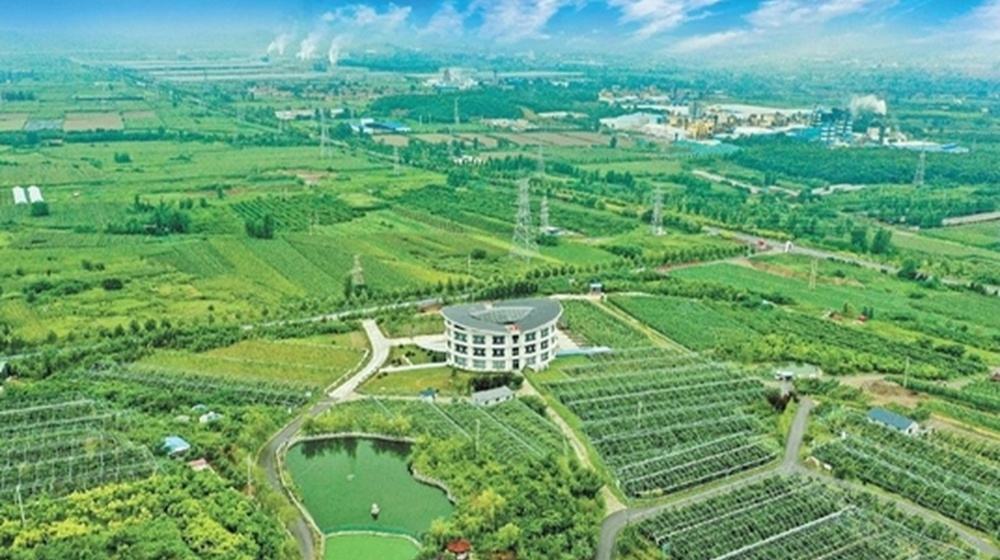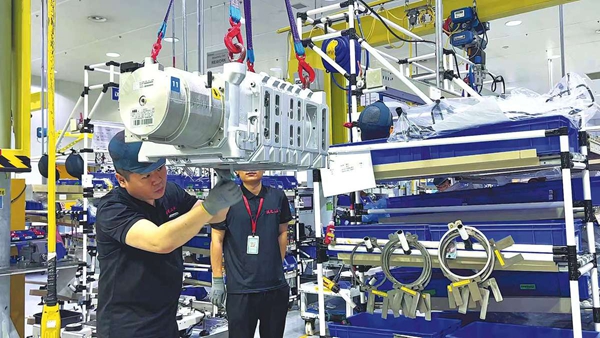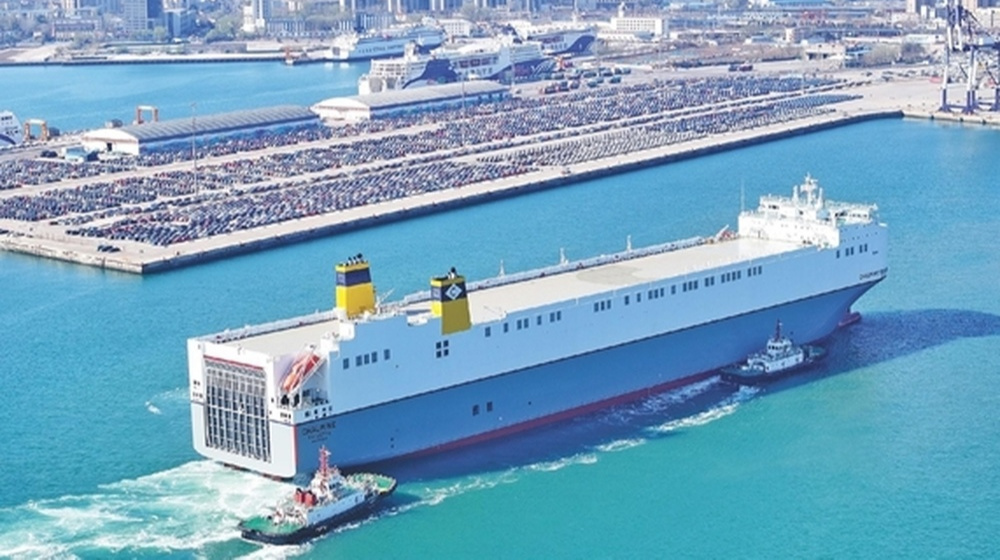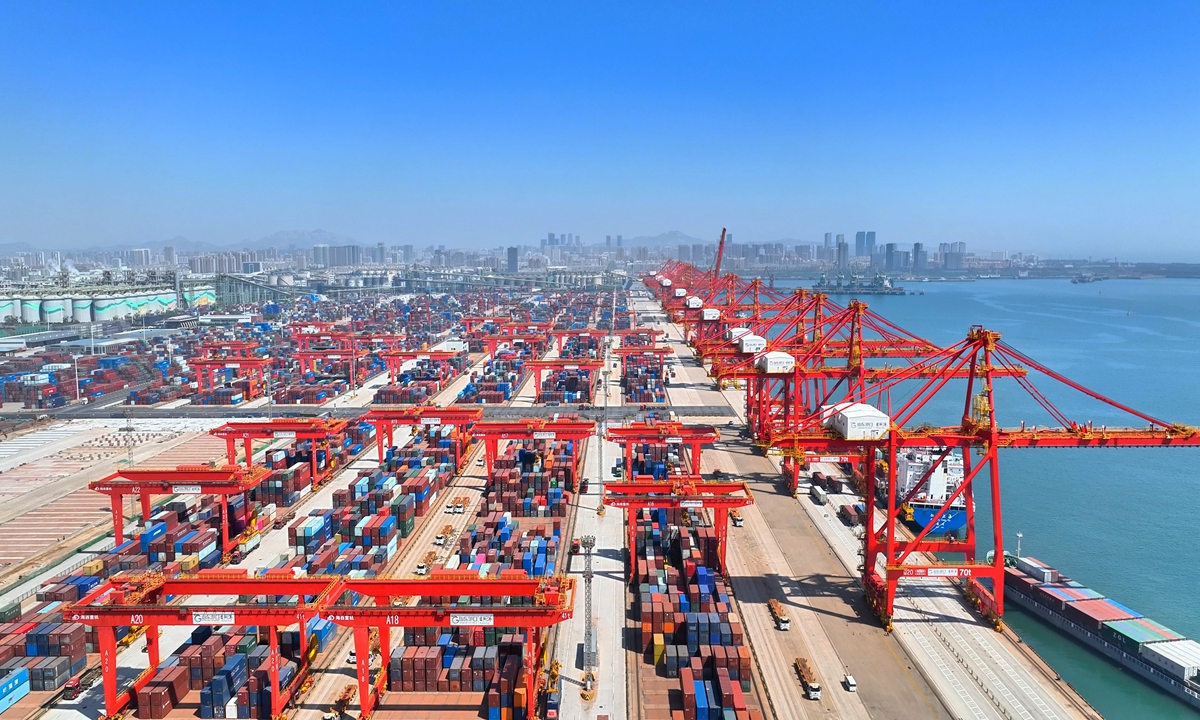
Aerial view of the automated container terminal at Rizhao Port of Shandong Port Group (File photo/Courtesy of Rizhao Port)
In the sunlit repair depot of Rizhao Port of Shandong Port Group, Xu Guannan stands in front of a giant 17-ton wheel loader. This beast of a machine, capable of lifting 3 cubic meters of coals in one scoop, is not humming well these days, sending its work efficiency down. Initial reports suggest the machine is hit by overheating problems, but dozens of parts could be the culprit.
A traditional repair work would by this time start climbing this behemoth and try to scout for faulty parts, guided by hunches and experience. Instead, Xu, deputy head of the Technology Innovation Center of Rizhao Port, reached into his pocket to grab his smartphone. From the small screen, Xu accessed the interface of a digital repair manual developed by his team of software engineers and powered by the latest artificial intelligence (AI) tool DeepSeek, which analyzed the problem in a flash and gave the answer: a ventilation valve on the gearbox is at fault.
This is just a snapshot of the high-tech-powered, smart operation of Rizhao Port, which has earned the highest praise for its successful transformation and upgrade over the years.
On the afternoon of May 22, 2024, Xi Jinping, general secretary of the Communist Party of China Central Committee, Chinese president, and chairman of the Central Military Commission, visited Rizhao Port, the Xinhua News Agency reported at the time.
Xi said that Rizhao Port, as a new port after China's reform and opening-up drive, has transformed itself from a traditional port into a modern one through scientific and technological innovation in recent years. It has not only made the cargo throughput among the forefront of the country, but also accumulated experience in developing new quality productive forces through the transformation and upgrading of traditional industries, which is worthy of praise, Xi said, according to Xinhua.
Currently, as global trade has encountered profound turbulence due to rising unilateralism and protectionism in certain parts of the world, China's focus on building modern ports and developing new quality productive forces underscore its unwavering commitment not only to high-quality development at home, but also to mutually beneficial trade with the rest of the world.
This is also the underlying logic of China's development of the port economy: Let the world share China's opportunities. In stark contrast to certain countries wielding the tariff stick against others, China is committed to building world-class ports to expand its "circle of friends" of trading partners, contributing to the stability of global supply chains.
'Chinese model'
Such a commitment translates into real action at Rizhao Port: autonomous trucks glide across the docks, guided by AI precision; Towering cranes, controlled remotely from a sleek command center, dance in perfect sync, unloading megaships with balletic grace.
Behind this futuristic symphony of machines working seamlessly together are years of dedicated efforts to transform this once modest port into a high-tech titan, earning accolades as a "Chinese model" for the transformation and upgrading of traditional terminals into fully automated container terminals worldwide.
For Xu and his team, that means harnessing the country's latest technological advancements to empower the port's operation.
Since last year, Xu's team sorted out and compiled a total of 400,000 paper maintenance log entries in the past 10 years for the port's dozens of wheel loaders and made all the information digitalized into a knowledge graph. "In a way, we perpetuated old repair masters' wisdom through digitalization and AI," Xu told the Global Times.
The adoption of large language model is just one facets of the port's efforts in harnessing the hardcore power of technology to empower the port's smart operations.
Tian Zhendong, a first-grade technician at the Technology Innovation Center of Rizhao Port of Shandong Port Group and a holder of the National May 1 Labor Medal, works at the port's 100-million-ton dry bulk cargo terminal.
The terminal handles the transportation and storage of over 70 types of cargo across five major categories. Following recent technological upgrades, it is now home to over 80 sets of automated equipment across 10 major categories, and operators control these machines from an office building located a thousand meters away.
In addition to remotely controlling portal cranes, a total of 24 industrial robots were employed to do the heavy and dirty job of cleaning coal-carrying rail cars and removing sticky coke. This solution alone has greatly improved unloading efficiency and slashed labor cost by 70 percent, Tian said.
"Our attitude toward automation is: once it's installed, we must use it. If we don't use it, we can't discover problems to help improve the system, and we can't truly enjoy the high efficiency automation brings," Tian told the Global Times.
Such a devotion from Tian and other workers at the port helped build the world's first parallel, open, and fully automated container terminal, which handles about 6 million TEUs a year with dozens of operator-less ship-to-shore (STS) container cranes and automated guided vehicles (AGVs) working in harmony around-the-clock. The automation resulted in a single machine efficiency boost by 50 percent and a reduction in overall cost by 70 percent, according to Rizhao Port authorities.
Green development
Smart operation is just one aspect of Rizhao Port's transformation witnessed by Tian, who started working at the port in 1989 and a second-generation port worker. His father participated in the construction of Rizhao Port in the 1980s, witnessing the port's transformation from a small fishing village on the East China Sea coast into a major coal port in China.
"In the past, city residents who lived near the port area could tell the main cargo being transported in the port in a given period by the color of the powder dust clinging on their windows - red is iron and black is coal," Tian said.
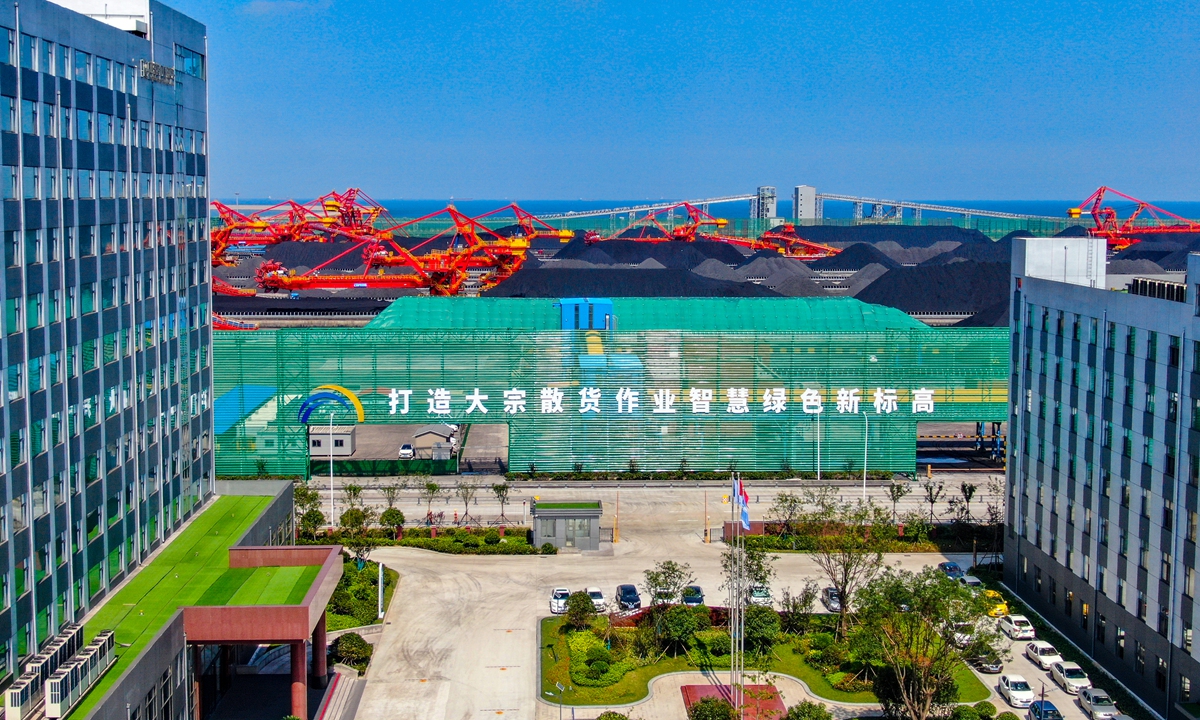
Aerial view of the automated container terminal at Rizhao Port of Shandong Port Group (File photo/Courtesy of Rizhao Port)
One defining moment of the port's history, Tian recalled, is a State Council guideline policy in 2022 stipulating support for Rizhao Port to become a smart and green demonstration port for bulk dry cargo.
"With the emphasis on ecological protection in the past decade and dedicated efforts in greening the port's operation area, we have a cleaner port and a cleaner city nowadays," Tian said, "The theme color of Rizhao Port's story has changed from one of red and black to one featuring green and blue."
Ultimately, efforts to ensure smart and green operations are aimed at bolstering Rizhao Port's core function of handling cargoes. And in that regard, the port has also seen remarkable achievements: the port is the world's youngest port achieving an annual throughput of 500 million tons; it ranks first in China in the throughput of seven types of goods, including iron ore, soybeans, petroleum and coke; and it has become a vital port supplying raw materials and bulk commodities to the "World's Factory."
Powering exports
During the visit to Rizhao Port in May 2024, Xi learned about the local progress in promoting the smart and green development of the port and expanding the opening-up, according to Xinhua.
Rizhao Port's transformation is aimed at not only supporting the country's high-quality development, but also promoting high-level opening-up. The point of having a world-class port lies in serving world-class trade, as some workers at Rizhao Port told the Global Times.
In recent years, companies in and around Rizhao city have seized the opportunity to advance port-industry-city integration and leveraged the port's shipping links with more than 100 countries and regions. Rizhao Port served as a vital link, efficiently bridging production resources with global demand and effectively facilitating the global expansion of more "Made in China" products.
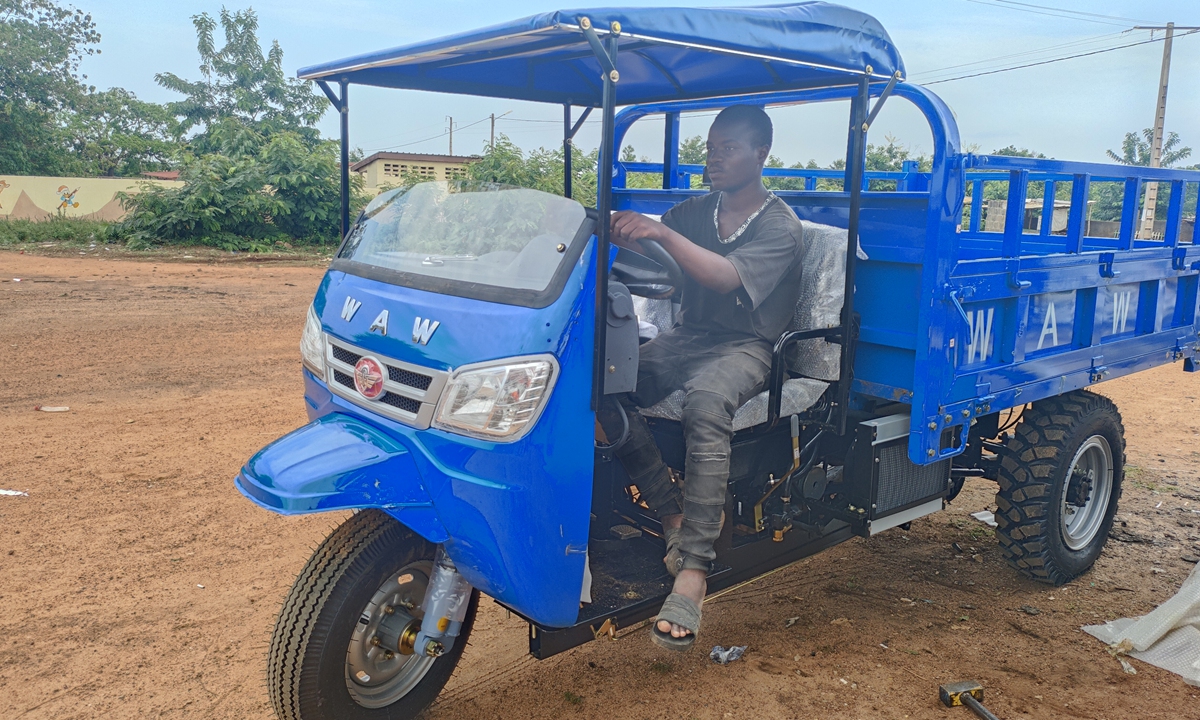
In May 2025, Wuzheng Group exported 1,000 diesel-powered tricycles customized for West African mining areas through Rizhao Port. (Photo/Courtesy of Wuzheng Group)
Wuzheng Group, a major player in China's agricultural and commercial vehicle industry, located in the nearby Wulian county, offers a prime example. Rizhao Port's advantages in land transportation, efficiency, and marine transportation costs have provided the company with efficient, economical, and reliable logistics services, giving its overseas businesses a high-quality boost, according to Liang Yong, head of the company's international cooperation department.
"A three-wheeled vehicle, great at traversing inferior roads, is produced every three minutes on average at our plant, and most are sold overseas to countries in Africa, including Ghana, Burkina Faso, and Tanzania," Liang Yong, head of the company's international cooperation department, told the Global Times.
In May, Wuzheng Group exported 1,000 diesel-powered tricycles customized for West African mining areas through Rizhao Port, setting a new record for a single shipment of Chinese diesel tricycles to Africa.
Behind that number is real stories of how "Made in China" products changing lives in countries and regions. Liang said that many African customers told him how the three-wheeled vehicles changed their lives and help them pursue better a life.
Wuzheng Group is hardly alone in leveraging the advantages offered by Rizhao Port to expand exports. Rizhao Yulan Intelligent Manufacturing Industrial Park, which is located just 15 kilometers from the port area, is also one of the companies utilizing the resources brought by the Rizhao Port.
The company's highly automated plant transforms steel rolls into tinplate, a premium product having great overseas demand for its use in the making of cans used for storing fast-moving consumer goods like infant formula and beverages.
"Most of Shandong's steel production occurs near Rizhao, where our facility is based," Wang Dawei, deputy general manager of Rizhao Yulan New Materials Co, "This grants us access to low-cost raw materials. At the same time, we benefit from the port's extensive shipping routes, facilitating our global exports."
With over 80 container shipping routes from Rizhao and over 360 shipping routes of Shandong Port Group, Rizhao Port is a major node in the New Eurasian Land Bridge Economic Corridor as well as an important link of the Belt and Road Initiative. In addition to more destinations of exports, the types of goods shipped from Rizhao have also expanded to include new products such as new-energy vehicles (NEVs).
In March, a batch of NEVs from Rizhao Port were officially shipped, marking a leap in the port's business related to the "new three" of China's tech-intensive and green exports - NEVs, photovoltaic products, and lithium batteries, according to local media reports.
The development story of Rizhao Port provides a footnote for China's steadfast efforts to strengthen its connection and exchanges with the rest of the world despite rising unilateralism and protectionism. Building world-class ports is one major aspect of those efforts, and China has made great strides - China is now home to eight of the world's top 10 busiest ports in terms of cargo throughput and seven of the world's top 10 ports in terms of container throughput, data from the Ministry of Transport showed.
"Port serves trade, and automation can make a port better. It is precisely this pragmatic attitude toward technological transformation that has enabled us to achieve what we have done so far and empowers our pursuit of a better tomorrow," Xu said.
编辑:曹晓旭






